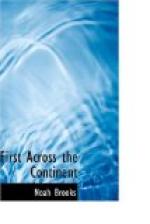It is almost incredible that these wild animals should have been so nearly exterminated by hunters and other rovers of the plains, very soon after travel set in across the continent. The writer of these lines, who crossed the plains to California so lately as 1856, saw buffalo killed for the sake of their tongues, or to give rifle practice to the wayfarers. After the overland railroad was opened, passengers shot buffalo from the car-windows, well knowing that they could not get their game, even if they should kill as they flew by a herd. There are no buffalo nor elk where millions once roamed almost unmolested.
Early in the afternoon of August 3, the party reached the junction of the Yellowstone and the Missouri, and camped on the same spot where they had pitched their tents on the 26th of April, 1805. They were nearing the end of their long journey.
But their troubles thickened as they drew near the close of their many miles of travel. The journal for August 4 has this record:—
“The camp became absolutely uninhabitable in consequence of the multitude of mosquitoes; the men could not work in preparing skins for clothing, nor hunt in the timbered low grounds; there was no mode of escape, except by going on the sand-bars in the river, where, if the wind should blow, the insects do not venture; but when there is no wind, and particularly at night, when the men have no covering except their worn-out blankets, the pain they suffer is scarcely to be endured. There was also a want of meat, for no buffalo were to be found; and though elk are very abundant, yet their fat and flesh is more difficult to dry in the sun, and is also much more easily spoiled than the meat or fat of either deer or buffalo.
“Captain Clark therefore determined to go on to some spot which should be free from mosquitoes and furnish more game. Having written a note to Captain Lewis, to inform him of his intention, and stuck it on a pole at the confluence of the two rivers, he loaded the canoes at five in the afternoon, proceeded down the river to the second point, and camped on a sand-bar; but here the mosquitoes seemed to be even more numerous than above. The face of the Indian




